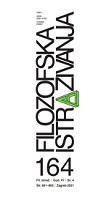Usporedba europske i azijske odgojno-obrazovne tradicije i njihova važnost u suvremenom kontekstu
Comparison of European and Asian Educational Traditions and Their Importance in the Contemporary Context
Author(s): Ružica JurčevićSubject(s): School education, Philosophy of Education, Pedagogy
Published by: Hrvatsko Filozofsko Društvo
Keywords: education; Confucianism; humanism; value; neoliberalism; university;
Summary/Abstract: The prevailing economic ideologies that have entered higher education in recent decades have disrupted the long tradition of humanistic ideals and values. This has led to a paradigm shift from learning per se to learning for the labour market, emphasising the technical-functional dimension of higher education and marginalising the role of education for human self-realisation. While many European universities embrace the neoliberal paradigm in teaching and learning, there is a growing literature in Southeast Asia on the revival of Confucian values in response to the hyper-specialisation of higher education. In an attempt to explore the relationship between humanistic and neoliberal approaches in the university, this paper will focus on the European and Asian (Confucian) educational traditions, their similarities and differences, and how they have been institutionalised to highlight the importance of restoring humanistic values in education in a neoliberal-oriented world.
Journal: Filozofska istraživanja
- Issue Year: 41/2021
- Issue No: 04/164
- Page Range: 751-764
- Page Count: 14
- Language: Croatian

